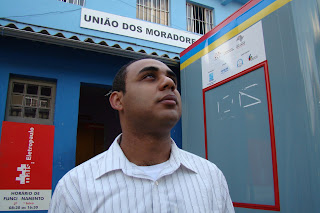None of the six “Obamas” running for office in Brazil – despite trying hard to capitalize on the American candidate's popular appeal and the wave of Obamania that has taken the country aback – succeeded in getting elected in the recent October 05 municipal elections. The Brazilian law allows candidates to run under whatever name or nickname they deem appropriate to attract electors’ attention, and at least one mayoral candidate and five candidates running for seats as local council members in different cities looked to the States as an inspiration. Portuguese Blog mentions the would-be Obamas, one by one:
- Brazilian Epaminondas Obama, running for a seat outside of São Paulo
- Obama, a woman running in Rio de Janeiro state
- Davi, the Obama of the Community, running in Minas Gerais
- “Barak Obama,” running in Paraná
- Alexandre Barack Obama, running in Petrolina
- Barack Obama of Belford Roxo, running in the suburbs of Rio de Janeiro
The last one on the list gambled on the coincidences. Communist candidate “Barack Obama”, whose real name is Claudio Henrique dos Anjos, wanted to be the first black mayor of Belford Roxo (portuguese for “Purple Belfort”), a city of just under 500,000 inhabitants in the Metropolitan Region of Rio de Janeiro. However, the “Barack Obama of Belford Roxo” had a vote count of zero on the 5th of October. According to the Superior Electoral Court (TSE), votes for him may have been classified as void due to his candidacy being challenged because he was signed up for more than one political party; nothing to do with the name. Two candidates were in the same situation and all together 34,181 (13.55%) votes cast for the prospective mayor of Belford Roxo were classified as void. Claudio Versiani [pt] publishes the picture below and quotes John McCain: “life is not fair”.
![]()
For the Obama running for a council seat in Ubiratã city, State of Paraná, there was even a spelling mistake - he was Barak Obama, without the “c” – a misspelling that many Brazilians make themselves. He had, however, 74 votes (0.58%) only, and, as with the others, failed to capitalize on the Obamania, which is, indeed, big. The Afroamericabrasil blog explains the reasoning behind this phenomenon:
The possibility of Obama becoming the first black president of the United States is also resonating with other blacks of the African Diaspora. On various online blogs and forums, Afro-Brazilians have also expressed excitement at seeing a man who looks as if he could be an Afro-Brazilian become the leader of the most powerful [country] in the world. With the rise of Obama, many Afro-Brazilians are also debating the possibility of a black president in a country where some believe blacks are actually the majority of the more than 190 million citizens.
If you find it amusing that Barack Obama was a popular choice, you may also like to know that other candidates have chosen to run as sport stars, such as Dunga, Pele, Zico, Zidane, Maguila and Tyson; politicians, such as Lula (nickname of the current Brazilian president); there was more than one Bin Laden (and none was elected). And, as if this were not enough, 15 candidates decided to register themselves as the fairytale character Pinocchio, and there was one Papai Noel (Portuguese for Father Christmas)!
However, regardless of the elections, other Brazilians are looking to Illinois for inspiration. Reporter João Prado [pt] has published an article he wrote based around an interview with a community leader called Gilson Rodrigues, nicknamed the “Obama of Paraisópolis”, who acts as a dwelling association president in the one of the São Paulo's slums. Below is an extract from this interview with Gilson ‘Barack’ Rodrigues ‘Obama’ about his take on the US elections:
Gostaria que esse cara ganhasse. Um preto na liderança dos EUA. Mas não é só isso. O cara tem um discurso que no mÃnimo é diferente do que a gente está acostumado. Por enquanto, aqui no Brasil são as mesmas caras. Acho que a gente precisa de um cara com um discurso mais próximo.
I would like this guy to win. A black person commanding the US. But it is not just that. The guy has a line of discourse that is different from what we are used to. So far, here in Brazil, there are the same guys. I think we need a guy with a discourse closer to his”.


